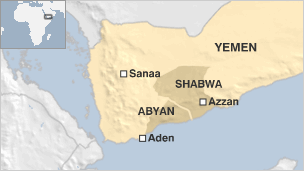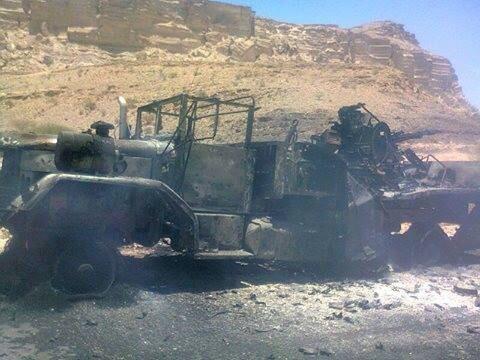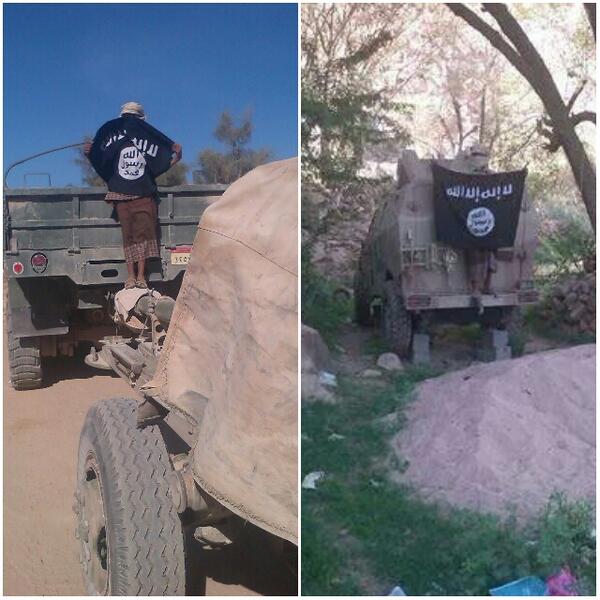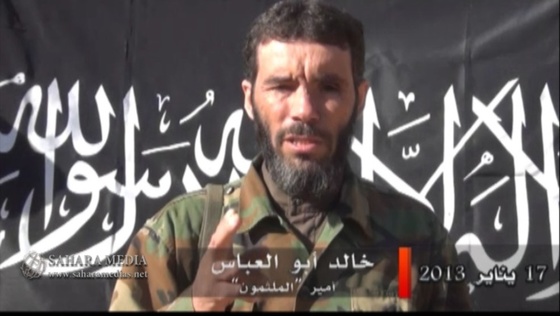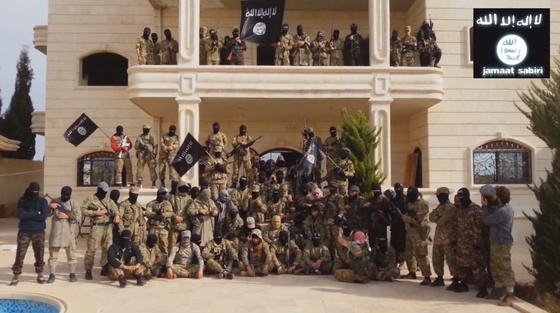![Abu Qatada Message on Jihad in Syria.JPG]()
On July 7, 2013, Omar Mohammed Othman, better known as Abu Qatada, was deported from the UK to Jordan to stand trial on terrorism charges. His deportation was the end of a legal fight in the UK that lasted more than a decade. Abu Qatada was first arrested in early 2001, only to be released and detained once again in October 2002. He spent years in British custody before a transfer agreement was finally reached between the two governments last year.
Since his return to Jordan, the man once dubbed Osama bin Laden's "European ambassador" has repeatedly weighed in on current events. He is not just commenting, however. He is providing ideological guidance to jihadists operating in Syria and North Africa. And al Qaeda's official branch in Syria, the Al Nusrah Front, now promotes messages from Abu Qatada online. In a recent latter published by Al Nusrah, Abu Qatada denounces Al Nusrah's rival in Syria, the Islamic State of Iraq and the Sham (ISIS).
Abu Qatada's ability to communicate with the outside world is troubling, US intelligence officials say, given the constellation of al Qaeda actors he has colluded with for decades. Western intelligence and law enforcement officials have compiled a thick dossier on his activities.
While Abu Qatada was held in the UK, some of his associates were detained elsewhere and transferred to US custody at Guantanamo. Declassified and leaked files describe the jihadist ideologue's place in the al Qaeda network.
"Abu Qatada was a London-based al Qaeda recruiter whose teachings influenced numerous extremists including some of the 9/11 hijackers, Richard Reid, and Zacarias Moussaoui," a leaked Joint Task Force Guantanamo (JTF-GTMO) threat assessment of one of Abu Qatada's associates reads. Richard Reid plotted to detonate a shoe bomb aboard an airliner in late 2001, and Zacarias Moussaoui was slated to take part in a second wave of attacks following 9/11. Another leaked JTF-GTMO threat assessment describes Abu Qatada as a "prominent al Qaeda spiritual leader, recruiter, and financier." Other al Qaeda-affiliated terrorists, including some of those responsible for the 2004 Madrid train bombings, were also inspired by Abu Qatada.
Ally of Al Nusrah Front, Zawahiri
With the outbreak of jihadist infighting in Syria, some have turned to Abu Qatada for advice. The Al Nusrah Front, in particular, counts Abu Qatada as a key ally. Tensions between Al Nusrah and the Islamic State of Iraq and the Sham (ISIS) boiled over last year. ISIS was subsequently disowned by al Qaeda's general command in early February, and the group has been waging a propaganda campaign against Al Nusrah and its other detractors since then.
Al Nusrah relies on Abu Qatada and other prominent ideologues to counter ISIS' messaging.
During a break in his trial in January, Abu Qatada denounced ISIS for "ignoring instructions" from al Qaeda emir Ayman al Zawahiri. ISIS will "disintegrate eventually," the jihadist cleric claimed, and its fighters have been "misled to fight a war that is not holy."
In a newly released letter, published by the Al Nusrah Front on April 28, Abu Qatada is even more critical of ISIS. [A copy of the cover of the pdf of Abu Qatada's letter is reproduced above.] The ideologue labels ISIS "the dogs of Hellfire," adding that he does "not hesitate to pass this judgment, because of their evil actions."
"I tried as much as possible to forward advice to them [ISIS] until they stopped listening to the word of truth, advice and guidance," Abu Qatada writes.
He goes on to praise the Al Nusrah Front as "the people of truth" and defends al Qaeda's senior leadership against the charges levied by ISIS' spokesman and backers, who claim that Ayman al Zawahiri has changed his ideology in such a way that al Qaeda is no longer Osama bin Laden's organization. "Nobody listens to these people except those similar to those making such claims, who do not know the history of people or their achievements," Abu Qatada argues.
In contrast to ISIS, Abu Qatada praises Al Nusrah's religious officials, including Sami al Uraydi, Abu Abdullah al Shami, and Abu Maryiya al Iraqi. He also praises Abdallah Muhammad al Muhaysini, a popular al Qaeda-linked Saudi cleric who has sided with Al Nusrah.
Influence in North Africa, ties to Ansar al Sharia Tunisia's leader
The dispute with ISIS is, in some ways, a replay of the past. During the 1990s, the Armed Islamic Group (known as the GIA, an acronym of its name in French) waged an insurgency against the Algerian government. The group became notorious for its indiscriminate use of violence against not only civilians but also fellow jihadists.
Abu Qatada was one of the GIA's main backers in London. Al Ansar, a GIA publication based first in France and then the UK, published his writings. In one fatwa (edict), Abu Qatada even justified the GIA's targeting of women, reasoning that because Algerian forces killed the jihadists' wives it was permissible to kill the spouses of Algerian security officials. The GIA's intra-jihadist conflicts were too much for Abu Qatada, however, and along with other leading jihadists he eventually denounced the GIA's leadership. Abu Qatada's decision to abandon his support for the GIA was seen as a major ideological blow to the group.
Soon, a new organization called the Salafist Group for Call and Combat (better known as the GSPC) was established with assistance from al Qaeda's leaders. The GSPC became the international jihadist community's preferred group and eventually evolved into al Qaeda in the Islamic Maghreb (AQIM), a formal branch of al Qaeda.
Abu Qatada retains a great deal of influence among jihadists in North Africa. In 2009, an AQIM commander demanded that he be freed in exchange for a European hostage. The hostage was killed when Abu Qatada was not freed.
Some of Abu Qatada's students continue to be leading players in the international jihad. One of them is Seifallah Ben Hassine (a.k.a. Abu Iyad al Tunisi), who was mentored by Abu Qatada in the UK.
Abu Iyad co-founded the Tunisian Combatant Group (TCG) in pre-9/11 Afghanistan "in coordination with" al Qaeda, according to the United Nations. The TCG became an arm of al Qaeda in Europe, plotting attacks against the US Embassy in Rome and other targets. The TCG was also involved in al Qaeda's assassination of Northern Alliance commander Ahmad Shah Massoud on Sept. 9, 2001.
Abu Iyad "was imprisoned in Tunisia after being captured in Turkey in 2003 for being a leader of an al Qaeda-affiliated organization," according to the UN. But he was freed in 2011, after the uprising in Tunisia began. He then established a chapter of Ansar al Sharia, which is tied to al Qaeda's affiliates (or branches), including AQIM.
Unsurprisingly, Ansar al Sharia Tunisia continues to honor Abu Qatada. The group repeatedly called for his release on its social media pages. And since Abu Qatada was deported to Jordan in July 2013, Ansar al Sharia has heavily promoted his writings.
In January of this year, a letter from Abu Qatada addressed to Ansar al Sharia Tunisia was featured on the organization's Twitter feed. Banner advertisements announcing the letter were downloaded by The Long War Journal at the time and can be seen here.
Abu Qatada says that Abu Iyad asked him to write the letter, which covers events in Libya, Syria, and Tunisia. Abu Qatada praises Abu Iyad, underscoring their close relationship, throughout the letter. He says Abu Iyad "is among the best of those I have known in intellect and estimation of matters," according to a translation by the SITE Intelligence Group. Abu Qatada calls on readers to rally around Abu Iyad, who "is the most knowledgeable of people of my intentions ... for he was the closest of people to me."
Ansar al Sharia recruits fighters for the Syrian conflict. But Abu Iyad did not want to lose Tunisia's youth to the jihad in Syria, Abu Qatada writes. According to the Jordanian cleric, however, the Tunisians' participation in the jihad there is a "blessed matter," even if some became too extreme upon arriving in the Levant.
Abu Iyad has commented on the infighting in Syria as well. In January 2014, he released a statement urging the rival factions to reconcile and focus their efforts on the Syrian regime. Abu Iyad said that he considers ISIS, the Al Nusrah Front, and all the jihadi factions to be his "brothers." He called on a number of al Qaeda ideologues, including Abu Qatada, to resolve the conflict. Chief among them, from Abu Iyad's perspective, was Ayman al Zawahiri, the "doctor of the Ummah" and "sheikh of the Mujahideen."
Since Abu Iyad's message was released in January, the situation in Syria has changed dramatically. Al Qaeda has officially disowned ISIS and so has Abu Qatada. It remains to be seen how much, if any, the Jordanian ideologue's rebuke influences matters in Syria. But some jihadists will continue to look to him for advice.
On April 27, the day before Al Nusrah released Abu Qatada's message denouncing ISIS, Ansar al Sharia Tunisia posted on its Twitter feed yet another banner promoting Abu Qatada's teachings.
